| Listing 1 - 10 of 13 | << page >> |
Sort by
|

ISBN: 3418000584 9783418000589 Year: 1978 Volume: 58 Publisher: Nürnberg Carl
Abstract | Keywords | Export | Availability | Bookmark
 Loading...
Loading...Choose an application
- Reference Manager
- EndNote
- RefWorks (Direct export to RefWorks)
Satire, Latin (Medieval and modern) --- Satire latine médiévale et moderne --- History and criticism. --- Histoire et critique --- History and criticism --- -Latin satire, Medieval and modern --- Latin wit and humor, Medieval and modern --- -History and criticism --- Satire latine médiévale et moderne --- Latin satire, Medieval and modern --- Satire, Latin (Medieval and modern) - History and criticism
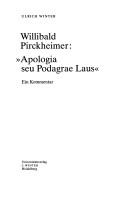
ISBN: 3825314200 9783825314200 Year: 2002 Volume: 43 Publisher: Heidelberg Universitätsverlag C. Winter
Abstract | Keywords | Export | Availability | Bookmark
 Loading...
Loading...Choose an application
- Reference Manager
- EndNote
- RefWorks (Direct export to RefWorks)
Satire, Latin (Medieval and modern) --- Latin satire, Medieval and modern --- Latin wit and humor, Medieval and modern --- Pirckheimer, Willibald, --- Pirckheimer, Willibald --- Satire [Latin ] (Medieval and modern) --- History and criticism --- Satire, Latin (Medieval and modern) - History and criticism.
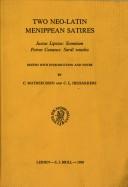
ISBN: 9004061606 9789004061606 Year: 1980 Volume: vol. 54 Publisher: Leiden Brill
Abstract | Keywords | Export | Availability | Bookmark
 Loading...
Loading...Choose an application
- Reference Manager
- EndNote
- RefWorks (Direct export to RefWorks)
Neo-Latin literature --- Satire, Latin (Medieval and modern) --- Satire latine médiévale et moderne --- Classical influences --- -Latin satire, Medieval and modern --- Latin wit and humor, Medieval and modern --- -Classical influences --- Satire latine médiévale et moderne --- Latin satire, Medieval and modern --- Satire latine médiévale et moderne. --- Satire, Latin (Medieval and modern) - Classical influences --- Satire, Latin (Medieval and modern). --- Satire latine médiévale et moderne. --- Classical influences.
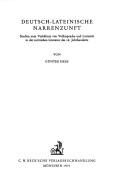
ISBN: 3406028411 Year: 1971 Publisher: Muenchen : C. H. Beck,
Abstract | Keywords | Export | Availability | Bookmark
 Loading...
Loading...Choose an application
- Reference Manager
- EndNote
- RefWorks (Direct export to RefWorks)
German literature --- Satire, German --- Satire, Latin (Medieval and modern) --- History and criticism. --- History and criticism --- Latin satire, Medieval and modern --- Latin wit and humor, Medieval and modern --- Satire --- Litterature allemande --- Litterature latine medievale et moderne --- Deutsche sprache --- 1500-1700 (moderne) --- Geschichte --- Frühneuhochdeutsch, 1350-1650
Book
ISBN: 113922607X 1108049087 Year: 2013 Publisher: Cambridge : Cambridge University Press,
Abstract | Keywords | Export | Availability | Bookmark
 Loading...
Loading...Choose an application
- Reference Manager
- EndNote
- RefWorks (Direct export to RefWorks)
The nineteenth-century antiquarian Thomas Wright (1810-77) was a prolific scholar, editor and bibliographer. His two-volume anthology of twelfth-century Latin poetry, first published in 1872, is the fullest available and this reissue will be especially useful to scholars of medieval schools, religious life and satire, and those interested in medieval literature's relationship with the Latin classics. It remains the only published edition of important poems by Geoffrey of Winchester, Hugh the Chanter, Reginald of Canterbury, Serlo of Bayeux and Gualo Britto. Volume 2 contains several hundred short epigrams and poems, including works by Marbod of Rennes, Roger of Caen, Serlo of Wilton and Henry of Huntingdon, along with a number of longer works, including Alain of Lille's influential Anticlaudianus and De planctu naturae. An appendix presents the eighth-century riddles of Tatwine and Aldhelm.
Satire, Latin (Medieval and modern) --- Verse satire, Latin (Medieval and modern) --- Epigrams, Latin (Medieval and modern) --- Latin poetry, Medieval and modern --- Latin literature, Medieval and modern --- Latin epigrams, Medieval and modern --- Latin verse satire, Medieval and modern --- Medieval Latin verse satire --- Modern Latin verse satire --- Latin satire, Medieval and modern --- Latin wit and humor, Medieval and modern
Book
ISBN: 9781400860975 1400860970 Year: 2014 Publisher: Princeton, NJ
Abstract | Keywords | Export | Availability | Bookmark
 Loading...
Loading...Choose an application
- Reference Manager
- EndNote
- RefWorks (Direct export to RefWorks)
To teach the truth smilingly was, during the Renaissance, a frequently expressed goal among prose writers and poets such as Erasmus, Berni, Ronsard, Rabelais, and du Bellay, who adopted an ironic posture within their mock encomia in order to refer the reader beyond the realm of the literary structure. In this book Annette Tomarken reconstructs the history of the classical satirical eulogy as it was revived, expanded, and finally adapted to new purposes in Renaissance literature. Tracing the development of this type of paradox from its classic roots through the Neo-Latin, Italian, and French mock encomia, Tomarken examines its various forms in the Renaissance, including the Pliade "hymne-blason," the mock epitaph, and the stage "harangue." Her book provides a new context for such works as In Praise of Folly and for such literary passages as Rabelais's praise of debts and Falstaff's denunciation of honor. Dividing the eulogies into three groups--praises of vices, disease, and animals and insects--Tomarken brings humor as well as close textual analysis to her study. She finds that the practitioners of the form were aware of its history and that such self-awareness became an integral part of the works themselves. An increased sensitivity to the literary structure and history of the paradoxical encomium, Tomarken stresses, first requires and then enriches our understanding of the genre's relationship to the extra-literary domain.Originally published in 1990.The Princeton Legacy Library uses the latest print-on-demand technology to again make available previously out-of-print books from the distinguished backlist of Princeton University Press. These editions preserve the original texts of these important books while presenting them in durable paperback and hardcover editions. The goal of the Princeton Legacy Library is to vastly increase access to the rich scholarly heritage found in the thousands of books published by Princeton University Press since its founding in 1905.
French literature --- Satire, French --- Eulogies --- Satire, Latin (Medieval and modern) --- Renaissance --- Romance Literatures --- Languages & Literatures --- French Literature --- Revival of letters --- Civilization --- History, Modern --- Civilization, Medieval --- Civilization, Modern --- Humanism --- Middle Ages --- Latin satire, Medieval and modern --- Latin wit and humor, Medieval and modern --- Praise --- Speeches, addresses, etc. --- History and criticism --- Foreign influences --- History --- History and criticism. --- Foreign influences.
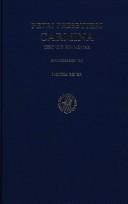
ISSN: 00769754 ISBN: 9004087974 9789004087972 9789004473980 Year: 1988 Volume: 13 Publisher: Leiden Brill
Abstract | Keywords | Export | Availability | Bookmark
 Loading...
Loading...Choose an application
- Reference Manager
- EndNote
- RefWorks (Direct export to RefWorks)
This is the first critical edition of two Latin Poems by the hitherto unknown Petrus Presbyter, who worked in France at the end of the 13th century. Petrus Presbyter displays, both by his use of meter and his re-use of satirical themes, close ties of form and content with the rhythmic poetry of the 12th century. His work draws its particular character from its author's membership of the Mendicant movement. The old religious orders in their contemporary manifesta- tions are subjected to harsh criticism. Petrus Presbyter also reveals himself in his satirization of social divisions as an acute observer of the world about him. Free of territorial considerations, he supports the Pope's claims to supremacy and his policy in favour of Charles I of Anjou. In his Altercatio Petrus Presbyter demonstrates in the Franciscan spirit the superiority of simple piety to learned knowledge and noble lineage. The edition is completed by a commentary to the content and sources of the texts.
Medieval Latin literature --- Christian poetry, Latin (Medieval and modern) --- Satire, Latin (Medieval and modern) --- Middle Ages --- Poetry --- -Dark Ages --- History, Medieval --- Medieval history --- Medieval period --- World history, Medieval --- World history --- Civilization, Medieval --- Medievalism --- Renaissance --- Latin satire, Medieval and modern --- Latin wit and humor, Medieval and modern --- Latin Christian poetry, Medieval and modern --- Latin poetry, Medieval and modern --- History --- Poetry. --- -Poetry --- Christian poetry, Latin (Medieval and modern). --- Satire, Latin (Medieval and modern). --- Middle Ages - Poetry --- Dark Ages
Book
ISBN: 9783487156637 3487156636 Year: 2018 Publisher: Hildesheim Georg Olms Verlag
Abstract | Keywords | Export | Availability | Bookmark
 Loading...
Loading...Choose an application
- Reference Manager
- EndNote
- RefWorks (Direct export to RefWorks)
Díaz de Luco, Juan Bernal --- Díaz de Luco, Juan Bernardo, --- Dialogues, Latin (Medieval and modern) --- Satire, Latin (Medieval and modern) --- Latin satire, Medieval and modern --- Latin wit and humor, Medieval and modern --- Latin dialogues, Medieval and modern --- Latin literature, Medieval and modern --- History and criticism --- Seneca, Lucius Annaeus, --- Erasmus, Desiderius, --- Annaeus Seneca, Lucius, --- Seneca, Annaeus, --- Seneca, --- Seneca, L. A. --- Seneca, Lucio Anneo, --- Seneka, --- Seneka, L. Annėĭ, --- Sénèque, --- סנקא, לוציוס אנאוס --- Pseudo-Seneca --- Influence. --- Seneca, Lucius Annaeus --- Seneca
Book
ISBN: 0820346403 9780820346403 0820346101 9780820346106 Year: 2014 Publisher: Athens, Ga.
Abstract | Keywords | Export | Availability | Bookmark
 Loading...
Loading...Choose an application
- Reference Manager
- EndNote
- RefWorks (Direct export to RefWorks)
In volume 1 of Jankyn's Book of Wikked Wyves (Georgia, 1997), Ralph Hanna and Traugott Lawler presented authoritative versions of three medieval texts invoked by Jankyn (fifth husband of the Wife of Bath) in The Canterbury Tales . In Jankyn's Book , volume 2, Lawler and Hanna revisit one of those texts by way of presenting all the known contemporary commentaries on it. The text is Walter Map's ""Dissuasio Valerii,"" that is, ""The Letter of Valerius to His Friend Ruffinus, Dissuading Him from Marrying."" Included in Jankyn's Book, volume 2, are seven commentaries on ""Dissuasio Valerii,"" edit.
Wife of Bath (Fictitious character). --- Tales, Medieval --- Satire, Latin (Medieval and modern) --- Satire, Latin --- Misogyny --- Married women --- Marriage --- Manuscripts, Latin (Medieval and modern). --- Latin satire, Medieval and modern --- Latin wit and humor, Medieval and modern --- Medieval and modern Latin manuscripts --- Manuscripts, Medieval --- Married people --- Women --- Wives --- Women-hating --- Misanthropy --- Sexual animosity --- Medieval tales --- Bath, Wife of (Fictitious character) --- Sources. --- Translations into English. --- History and criticism. --- Humor. --- Chaucer, Geoffrey, --- Chaucer, Jeffrey, --- Chʻiao-sou, Chieh-fu-lei, --- Chieh-fu-lei Chʻiao-sou, --- Choser, Dzheffri, --- Choser, Zheoffreĭ, --- Cosvr, Jvoffrvi, --- Tishūsar, Zhiyūfrī, --- Characters --- Wife of Bath. --- Manuscripts, Latin (Medieval and modern)
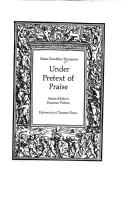
ISBN: 0802052908 Year: 1973 Publisher: Toronto
Abstract | Keywords | Export | Availability | Bookmark
 Loading...
Loading...Choose an application
- Reference Manager
- EndNote
- RefWorks (Direct export to RefWorks)
Erasmus, Desiderius --- Satire, Latin (Medieval and modern) --- Irony in literature. --- Fiction --- History and criticism. --- Technique. --- Erasmus, Desiderius, --- Fictional works. --- Irony in literature --- -Fiction --- Metafiction --- Novellas (Short novels) --- Novels --- Stories --- Literature --- Novelists --- Latin satire, Medieval and modern --- Latin wit and humor, Medieval and modern --- History and criticism --- Technique --- Philosophy --- -Fictional works --- -History and criticism --- Fiction writing --- Writing, Fiction --- Authorship --- Érasme --- Desiderius Erasmus --- Erasm, Dezideriĭ --- Erasme, Désiré --- Erasmo, --- Erasmo, Desidério --- Erasmus, --- Ėrazm, --- Erazm, --- Roterodamus, Erasmus --- Rotterdamskiĭ, Ėrazm --- Rotterdamský, Erasmus Desiderius --- Роттердамский, Эразм --- Эразм, --- Ерасм, Дезидерий --- Erasmus Roterodamus, Desiderius --- Erasmus --- エラスムス, デシデリウス --- Desiderius Erasmus, --- Erasm, Dezideriĭ, --- Erasme, Désiré, --- Erasmo, Desidério, --- Roterodamus, Erasmus, --- Rotterdamskiĭ, Ėrazm, --- Rotterdamský, Erasmus Desiderius, --- Роттердамский, Эразм, --- Ерасм, Дезидерий, --- אראסמוס, דסידריוס,
| Listing 1 - 10 of 13 | << page >> |
Sort by
|

 Search
Search Feedback
Feedback About UniCat
About UniCat  Help
Help News
News